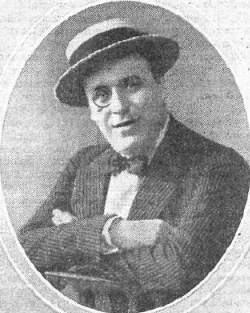

Queer Places:
University of Oxford, Oxford, Oxfordshire OX1 3PA
Nuevo Café de Levante, Calle del Arenal, 15, 28013 Madrid, Spain
 Antonio
de Hoyos y Vinent (May 2, 1884 or 1885 - June 11, 1940) was a Spanish writer and
journalist, belonging to the aesthetic trend of decadentism . He held the
title of Marquis de Vinent .
Antonio
de Hoyos y Vinent (May 2, 1884 or 1885 - June 11, 1940) was a Spanish writer and
journalist, belonging to the aesthetic trend of decadentism . He held the
title of Marquis de Vinent .
He was born on May 2, 1884 in Madrid, within an aristocratic family, second son of Isidoro de Hoyos y de la Torre, marquis of Hoyos, and Isabel Vinent y O'Neill, marquise de Vinent. [ 1 ] In 1898 his family moved to Vienna , where he received a careful education at the Teresian school. He followed his studies at the University of Oxford and Madrid. [ 2 ] His older brother, José María de Hoyos y Vinent , inherited the paternal title of Marquis de Hoyos [ 1 ] , and he inherited the marquis title of his mother.
Deaf because of measles, provided with monocle and dressed as a dandy, he did not worry about hiding his homosexuality , which together with his defects, turned him into a black sheep for the less tolerant part of good society (his mother will withdraw her greeting for having hung in his living room his collection of portraits of young boxers). His friend César González Ruano said that "he was an impressive being and had an even more impressive house". [ 3 ] Hoyos directed the Gran Mundo Sport magazine and made literary criticism for El Día and articles for ABC . He was interested in working class men and was often seen with them in salons and literary cafés. Mira says that homophobia did not brutally affect Hoyos's life, his social class and his fame gave him a certain immunity.
He was a friend of Emilia Pardo Bazán , who was his introducer in the literary world, and whose home gathering he frequented. He was also a friend of the dancer Tórtola Valencia, of the cartoonist and art-deco artist José Zamora, of his aunt Countess Gloria Laguna , of the strange marquis of Villalobar and of the painter Antonio Juez .
Homosexuality appears explicitly in a couple of his novels. In them, social repression plays a role, embodied in an institutionalized religion. Homosexuality appears, not as mere perversion, but as dissent.
Since 1934, he was a member of the Iberian Anarchist Federation (FAI). This fact, and his combative articles published in El Sindicalista (organ of the Trade Union Party ), took him to Porlier prison at the end of the Civil War, and in it he died poor, blind, deaf, almost paralyzed and abandoned by his old acquaintances and his family on June 11, 1940.
My published books: